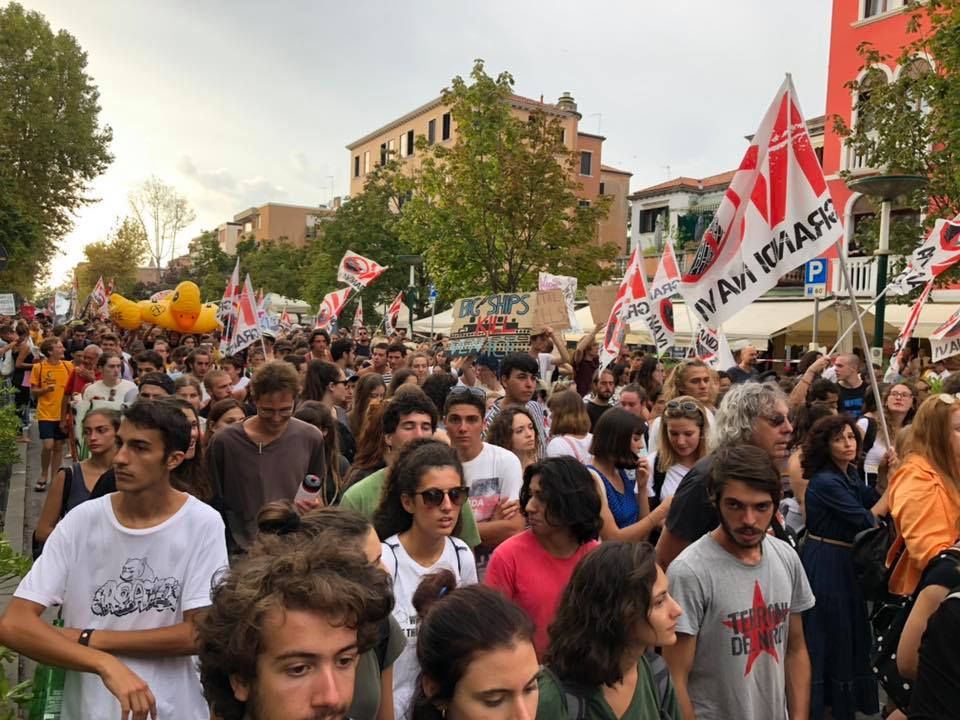Commentary
The echo of Venice, a cry of rage between land and sea
In Venice, the mix between local and global is part of the very nature of the city. At the edge of the sea, it is a place that must reckon with unceasing changes in real time.

The kind of direct action we saw in Venice this weekend is the solution. This means fighting a justified and (rightfully) angry fight, not only against the declared or covert enemies of the environment and of humanity, but also against the inanity of preaching an ecologist message while having no real ability to change things at the policy level. This is the true, and truly contemptible, “do-gooderism” of our time: cheap sentimentality towards the environment, with empty talk, vacuous good intentions, songs and postcards showing the before and after (“Oh, how beautiful my valley used to be…”). All of which leave things precisely as they are: on a path toward catastrophe.
Few places showcase this situation as well as Venice, a theater for protest, but also itself a protagonist in these protests, because the promoters of the Climate Camp and its concluding march, organized together with FridaysForFuture, are part of movements of local residents fighting for another Venice, different from the one marked by the MOSE project, the enormous cruise ships, speculation and rent-seeking—a different Venice from the one which seems to have already surrendered to the very potent forces trying to consume it altogether.
In Venice, the mix between local and global is part of the very nature of the city. At the edge of the sea, it is a place that must reckon with unceasing changes in real time. It’s no surprise that the best-known and proverbial Venetian maxim is “Sìe ore ea cala, sìe ore ea cresse” (“Six hours she falls, six hours she rises”), referring to the sea’s tides, which the Venetians know both through primordial tradition and mathematical knowledge (because in Venice, everything is both mathematical and a part of primordial tradition at the same time). Nowadays, however, even this tried-and-tested “local” knowledge is being negated by climate changes in a world “out of joint.”
On the other hand, the Venetian lagoon, a quiet port and a historical safe harbor, was first disrupted by 20th century tampering (new channels were built, allowing too much water to enter in terms of quantity and speed, channels were filled up, restricting its perimeter, and chemical spills polluted its waters and lands), and then crisscrossed by the outsized arrogance of the mega-cruise ships and brutalized by the MOSE project, ineffective and already showing its age: not only a case of public corruption, but one of a lack of vision, a pseudo-cure which is being rendered irrelevant by the scale of the problem it’s supposed to treat (if the sea level rises further, it will be unusable: either the tide will simply wash over it, or, even if the tide stays just below the height of the sluice gates, as long as these are under constant pressure, the continued closure of the lagoon will transform it into a dying stagnant pond).
No other setting is more appropriate for the most necessary protest of our age, even though the interweaving of global and local issues has now become crucial everywhere, in every part of the globe. But this particular spot, a place of wonder for a whole cycle of civilization, which fact renders the risks it faces all the more poignant, certainly has a special meaning and a greater echo.
Once upon a time, André Chastel wrote that “Venice has become the symbol of our responsibilities. The Venetian challenge is none other than the central episode of the crisis of the modern world, which will have to re-examine its way of life.” Not a line from a movie, but the loud and clear message of the protestors that gathered Saturday at the Venice festival, on the prestigious red carpet of the elites of world cinema.
Originally published at https://ilmanifesto.it/leco-di-venezzia-un-grido-di-rabbia-tra-terra-e-mare/ on 2015-10-08
